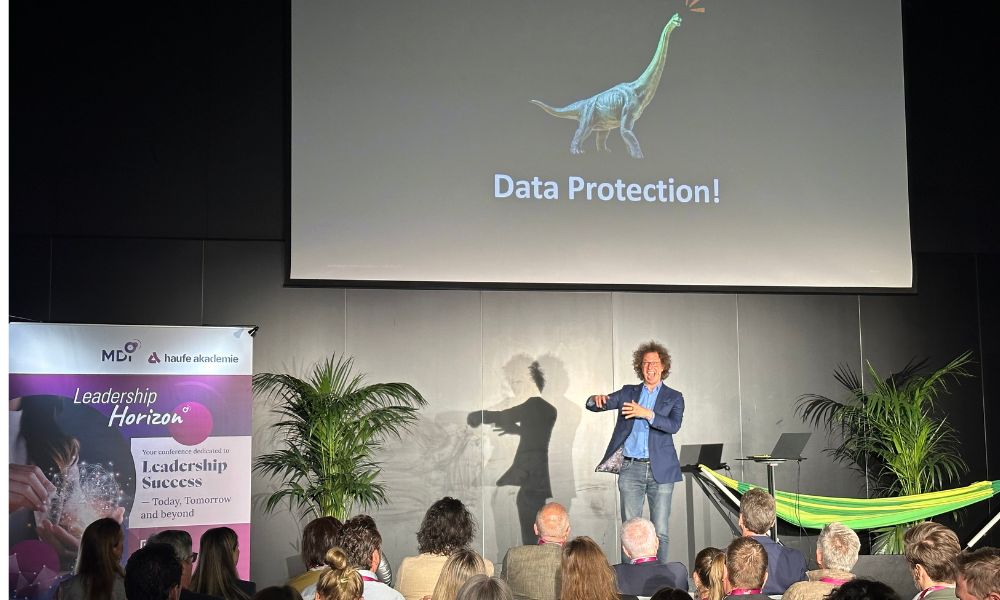
From Lab to Practice: What We Learned With AI
From Lab to Practice: What We Learned With AI
Do you prefer to listen to this article? Click here to access our AI-generated audio version!
From Lab to Practice: What We Learned With AI
AI in organizations isn’t a one-size-fits-all solution.
And in people development, this becomes even more obvious: AI only creates value when it’s tailored to how people actually learn and practice skills.
At MDI, we’ve been working on this question for more than 1.5 years. What started as an internal experiment with ChatGPT quickly grew into our AI Leadership Lab – a sandbox where we could prototype, test, and refine how AI could support leadership development.
Our Journey With AI
Along the way, we moved from simple chatbots to immersive roleplays with voice and avatars. We discovered that immersion is not an add-on, but the goal. Our first demos now feel almost nostalgic – clicking a button, waiting for a response – compared to today’s fluid dialogues with emotional, human-like voices.
We also learned that systemic design matters more than model hype. GPT-3.5 to 4 was a leap, but not a breakthrough. The real difference came from how we designed scenarios: choosing the right challenge, calibrating resistance, and iterating with our trainers until the practice felt authentic.
And finally, we realized that feedback cannot be generic. AI’s true learning value comes when feedback is contextual, practical, and directly connected to the learner’s performance. That’s why we co-created feedback models with our trainers, based on real workshop experience.
Those internal learnings became the foundation of our Lab. But what happens when you take this approach outside – into client organizations?
From Internal Lab to Client Projects
In our first client projects implementing the AI Leadership Lab, one thing became crystal clear:
Success doesn’t depend on AI itself – it depends on how well the application is tailored to the organization.
Here’s what we learned in practice:

1. Industry- & Company-Specific Adaptation
Generic simulations don’t work. For AI learning to have impact, scenarios must reflect the company’s reality:
- the industry’s challenges,
- the roles participants actually face,
- and the objectives that matter most.
That’s why we don’t deliver “out of the box” roleplays. We co-develop scenarios with clients, allowing participants to rehearse the exact conversations and situations they encounter in their day-to-day work. AI enables the scaling of this realism across multiple contexts.
2. Co-Creation as a Success Factor
An AI Lab isn’t something you roll out. It has to emerge in co-creation:
- our 1.5 years of Lab learning,
- combined with our leadership development expertise,
- and the client’s own learning and development (L&D) goals, models, and training structures.
This triangulation is what makes the Lab not only innovative but also credible, relevant, and sustainable within the organization.
3. Integration over Isolation
AI roleplays only create value when they are integrated into existing learning journeys, not used as isolated demonstrations.
That means embedding them into training modules, aligning them with objectives, and positioning them as part of the transfer process.
This way, AI strengthens the overall program instead of standing apart. It becomes a sustainable elementof leadership development – not just an add-on.
From experiment to system
Looking back, there’s a clear arc:
- In our internal Lab, we learned the principles of immersion, design, feedback, and stakeholder involvement.
- In client projects, we learned how to apply these principles to various industries, cultures, and learning and development (L&D) structures.
Together, these experiences show how AI can move from experiment → tailored system → scalable practice.
Final reflection
AI will not transform leadership development on its own. But when it is:
- adapted to the industry and company context,
- co-created with trainers, participants, and L&D teams,
- and integrated into existing programs,
…then it can turn training into truly immersive, relevant, and scalable development.
That’s the future we’re building with the AI Leadership Lab – step by step, from lab to practice.

Rafael Ungvari
Artificial Intelligence Expert
Rafael is an AI specialist at MDI and is working to redefine leadership development through artificial intelligence. To implement this idea, he has worked with our team to establish the MDI AI Leadership Lab, which serves as a hub for experimenting with and applying AI solutions together with clients and trainers.
His work builds on his studies in business informatics at WU Vienna, where he combines business perspectives with technical expertise to develop practical and sustainable digital solutions.













